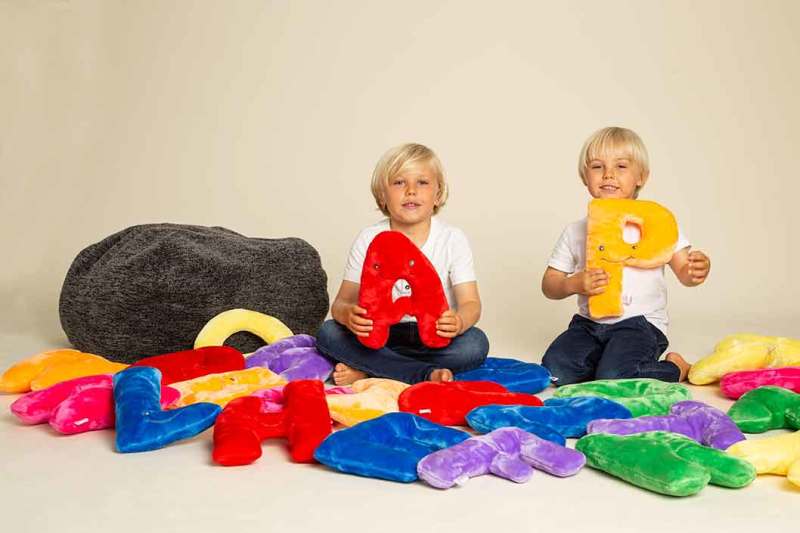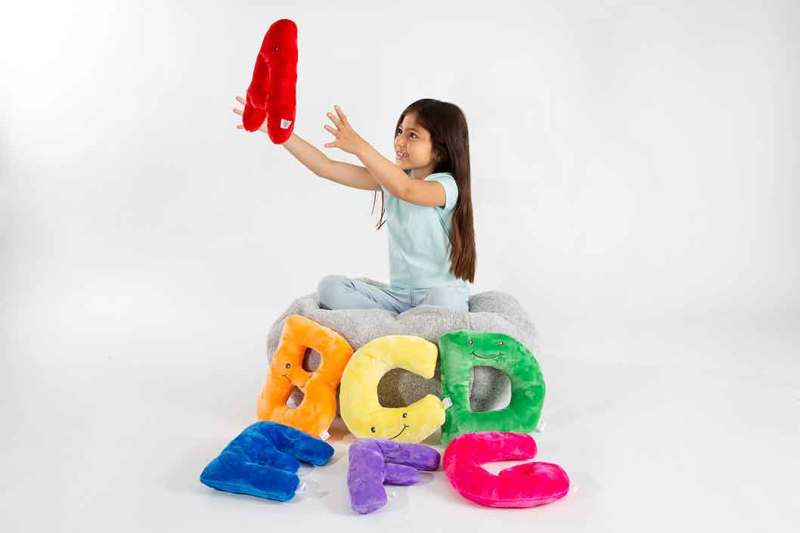
Building Literacy Skills with Alphapals
December 20, 2023
Young kids primarily develop literacy skills through exposure to oral language, books, and meaningful interactions. Early literacy helps with a child's self-expression, cognitive development, and reading comprehension.
Research has shown that children who are introduced to literacy concepts early often have better language acquisition and reading skills. Parents should strive to incorporate interactive literacy activities into everyday routines to help preschoolers gain the essential tools they need to become fluent readers and lifelong learners.
This article looks at how teachers and families can use language and literacy activities for toddlers to nurture the development of early language and literacy skills.
Creating a Literacy-Rich Environment
To nurture early solid language and literacy skills, families can design a print-rich space that contains multiple age-appropriate reading materials. Having fun storybooks in the home inspires a love for reading while helping toddlers understand written words in a meaningful context.
Creating a literacy-rich environment also entails incorporating labels and signs that kids can use to point out print and role-play. For parents, wearing Alphapals T-shirts can be a creative way to teach the alphabet on the go by pointing to the letters on the shirt.
Everyday interactions also provide numerous opportunities for young kids to correlate abstract language rules with real-life situations. Families can introduce vocabulary by pointing out words on billboards or encouraging kids to read labels on food items.
Children also learn essential literacy skills through storytelling and back-and-forth conversations. Parents may encourage preschoolers and toddlers to narrate their experiences during meals or storytime to enrich their vocabulary and communication skills.
Preschool Literacy Activities
Interactive reading is essential for healthy brain development and can help kids understand print conventions and concepts.
For a strong literacy foundation, consider choosing age-appropriate books with visual aids and immersive storylines to spark imagination and reinforce comprehension. While reading to toddlers, encourage discussion by asking probing questions to support listening and self-expression.
Literacy activities for preschoolers that feature plush letters can make reading sessions more interactive by allowing parents to reenact the stories. Moreover, word recognition games provide opportunities for children to practice oral language and gain literacy skills. For instance, kids can play the 'Word of the Week' game on Alphaland or make 'alphabet soup' with toy letters to boost their vocabulary acquisition.
Songs and rhymes are also fun activities supporting reading readiness and phonemic awareness. Kids enjoy action songs that combine rhyming, melody and repeated gestures to stimulate auditory perception and literacy growth.
Language and Literacy Activities for Toddlers
Speech-language pathologists recommend using tactile learning aids to introduce literacy concepts such as shapes, colors, and simple words. Alphabet toys like Alphapals come in various colors and have a tactile design that enhances language, literacy, and sensory development.
Singing nursery songs like 'Old Macdonald' and 'Simon Says Rhyme' is another excellent way to promote language development by helping kids memorize similar words and phrases.
While introducing the world of literature to toddlers, consider utilizing hands-on literacy activities that facilitate sensory learning. Tools like alphabet blocks, plush letters, or sandpaper letters can be used to design texture-based activities that appeal to the touch and provide vivid sensory experiences.
Moreover, interactive activities incorporating play with letters and simple words can enhance literacy proficiency for preschoolers by making learning fun and interactive. Playing games like 'Sight Word Treasure Hunt' with plush alphabet toys allows kids to connect letters with words and objects in their environment.
Promoting Literacy through Play
Establishing a routine integrating literacy into daily play is one of the surest ways to promote reading readiness in kids. Play-based learning can feature educational toys with letters that encourage young learners to explore the alphabet and identify letter-sound relationships.
Parents can also support reading comprehension and phonics learning through storytelling and organic conversations, allowing children to blend sounds and grow their vocabulary. Furthermore, incorporating activities like 'I Spy' or 'Sound Box' encourages preschoolers to communicate and activate their imagination and critical thinking.
Family Involvement in Literacy Development
The involvement of family members in the learning process is crucial for early literacy development. Parents and guardians can instill a fondness for grammar and reading in young learners by reading books and participating in interactive literacy games.
Remember that book selections matter—children respond best to reading materials that stimulate deep thinking and allow self-expression. Age-appropriate books like 'Chicka Chicka Boom Boom' and 'Eric Carle's ABC' are popular with preschoolers as they contain many colorful illustrations and foster curiosity and a sense of empathy for the characters.
Encouraging role-playing and displaying enthusiasm during reading sessions can make storytime interactive and show little learners the joy reading can bring. Be sure to create a comfortable learning environment with fun-filled books, pillows, and sensory toys to help kids relax while reading.
Utilizing Technology for Literacy Learning
In today's digital world, many families and educators rely on technology to support early language and literacy learning.
Age-appropriate tech tools like interactive e-books and educational websites feature fundamental literacy instruction and engaging activities that prepare preschoolers for future academic success.
Moreover, digital resources such as phonics and letter recognition apps can provide ample literacy activities, immediate feedback, and customization to help toddlers decode sounds and learn the alphabet.
Assessing and Adapting Literacy Strategies
Early childhood educators can actively assess and adapt literacy strategies to ensure toddlers develop into skilled and fluent readers.
Kids typically demonstrate engagement by recognizing new letters, singing along to rhymes, and showing curiosity about storybook characters. Over time, kids should be able to form letters and gradually start reading simple words and sentences.
For struggling learners, parents may need to adjust literacy activities based on a child's development and reading abilities. Most children overcome learning obstacles when exposed to multi-sensory experiences that engage their senses of touch, sight, and sound. Sensory play using Alphapals products can enhance alphabet learning and impact language and fine motor skills.
Further Literacy Support with Alphapals
Building early literacy skills is a multifaceted process that requires parents to create language-rich environments and incorporate engaging learning experiences into everyday routines. This holistic approach promotes language and literacy development from an early age, empowering kids to become proficient readers and writers.
Literacy-building strategies incorporating interactive storytelling, nursery rhymes, and word games can foster a love for reading. Moreover, engaging preschoolers in interactive activities featuring plush alphabet toys can promote sensory development, phonemic awareness, and overall literacy proficiency.
Shop Alphapals Sets here and discover a new way to support your child's language and literacy growth.









